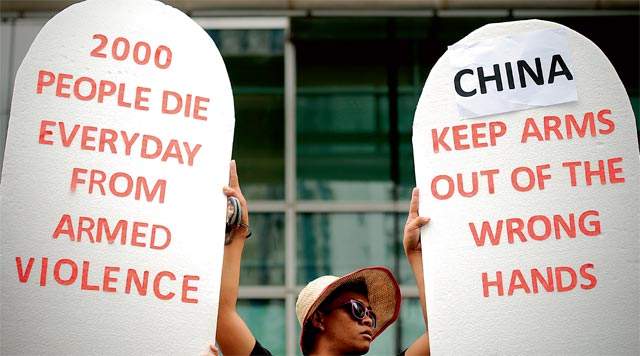Ich bin ein Berliner – Agreement needed on new standards to regulate arms trade
 Agreement needed on new standards to regulate arms trade
Agreement needed on new standards to regulate arms trade
This article by Shazia Rafi was originally published in the Khaleej Times
The signatory countries of the Arms Trade Treaty [ATT] will huddle together in Berlin to prepare for the ATT’s entry into force on December 24, 2014. Of the global arms trade, the top five importing countries are in the South and West Asian region — India, China, Pakistan, UAE and Saudi Arabia. It is a landmark achievement by the Arms Trade Treaty negotiators that the top five producers in 2013 — the P-5 of the United Nations Security Council — Russia, US, China, France and the United Kingdom — eventually ceded adoption of the Treaty. UK, France and Germany among top producers are states parties and ATT advocates. Of the top importers only the UAE has signed the treaty.
While some 88 countries had varying degrees of weapons export controls, the ATT brings a coherence and higher common standards. Key elements of the Arms Trade Treaty include putting all arms transfers on record, robust reporting mechanisms , requiring exporting countries to make assessments on importers Human Rights violations and whether the arms transfer will destabilize ongoing conflict. The Arms Trade Treaty is also the first international treaty to make specific provisions for gender-based violence.
The South and West Asia region has over 60 per cent of the global annual deaths due to conflicts and armed violence. This is a challenge for the region’s rapidly growing economies and financial hubs. Al-Shuraiqy, MP, UAE, is clear on this point. “Our country’s economy is based on investments from all over the world; investments require stability and order, so a treaty that regulates/controls arms is good and this why we were one of the first country’s to sign the Arms Trade Treaty,” he says.
Joining Germany as co-host is Mexico, which is also hosting the first Conference of States Parties [CSP] next year. Senator Laura Rojas of Mexico explains their commitment, “Our region is one of the most impacted by illicit commerce of arms… from one of the largest producers/exporters of arms next door where arms are legal; it is easier to get guns in Walmart than antibiotics in pharmacy,” says Rojas..
What’s at stake in Berlin are the nuts and bolts of the Arms Trade Treaty, according to Rachel Stohl, arms control expert, Stimson Center. These include Secretariat responsibilities, staff, sizing, mandates and participation of the signatories, non-government organisations, industry, rules of procedure, voluntary trust fund and precisely how the reporting is going to work.
The most contentious decisions which will be discussed in Berlin but finalised by the Conference of States Parties in Mexico are where the permanent Secretariat will be based and how independent it will be from the UN.
Three countries have bid for the Secretariat. Switzerland, (Geneva) and Austria (Vienna) both have been traditional bases of UNs work on Disarmament, Arms Control, Non-Proliferation, drug control with established conference facilities, resident arms control experts and postings of senior diplomats. The third is a new bid by Trinidad and Tobago, a resource rich developing country well able to cover the financial/logistical needs of the Secretariat.
“This is not a prestige project “says Ambassador Eden Charles of Trinidad and Tobago. “Caricom is a region impacted by transboundary weapons and crimes.” The venue of the Secretariat is about more than equity. “Trinidad and Tobago is also among first states to call for secretariat independent of the UN” says Charles.
As the date of enforcement nears, countries on the fence are reviewing their position. Pakistan which went from voting No to Abstain to Yes is one of them. Naveed Qamar, a member of parliament and the former defense minister, supports joining. “China I understand is reviewing their opposition so we are also reviewing our position,” he said. Pakistan’s United Nations Ambassador Masood Khan confirms that an inter-agency review is underway “We voted for the ATT. De had some reservations which we are trying to address.”
The world will soon honour a young girl’s courage, despite being shot by an illegal weapon at point blank range by an extremist. Fitting tribute to Malala that following her Nobel Peace Prize a permanent, legally-binding treaty to reduce such arms will become international law.
